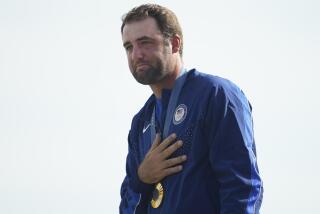Europeans much better in team play
- Share via
CARNOUSTIE, SCOTLAND — A maudlin but irresistible tradition has sprouted and blossomed at the British Open.
Each July, somewhere on the island of Britain, throngs of golf intellectuals gather and theorize on just how in creation the European continent has not won a major golf tournament since the 1999 British Open.
Pioneering discussions occurred here and there in 2004, when the drought had reached 19 majors, and in 2005, when it had hit 23. The tradition mushroomed into full-fledged hand-wringing by 2006 at 27 winless majors.
Just ahead of the 136th Open at Carnoustie Golf Links, the numeral does not so much stand as shout at 31, and the esteemed golfers of a prosperous continent lurk ever nearer to a strange non-accomplishment.
If they can manage to win zero of the next 10 majors, a distinct plausibility, the same Europe that holds down 25 of the world’s top 100 rankings and treats the United States Ryder Cup team like a stuffed animal in a retriever’s mouth, will wind up 0-for-the-decade in majors.
“I think it’s amazing that it’s been that long,” said Paul Lawrie, the last European to win a major, at Carnoustie.
Lovely but not overly populous New Zealand has no such drought. Canada, more noted for an icy game, has no such drought. Golf havens Australia and South Africa have won since Lawrie, the latter three times. Argentina hasn’t won a major since ... the last major.
And wee Fiji, population merely 905,000 to Europe’s 710 million?
The Observer newspaper summarized that situation in a headline, “Fiji 2, Europe 0.” It’s a bit of a puzzle. Europeans routinely won major tournaments in the 1980s, when they won nine of the 40 (four from Seve Ballesteros), and in the 1990s, when they won nine of the 40 (four from Nick Faldo). When the Spaniard Sergio Garcia, then just 19, made an Illinois tree famous in the 1999 PGA and nibbled at the backside of champion Tiger Woods one month after Lawrie’s win, it seemed the continent would go on flourishing.
Then, 31 majors, and, well Garcia has four top-five finishes. Thomas Bjorn of Denmark has four top-five finishes. Their continent has 22 top-five finishes. Bjorn should have won the 2003 British Open but took three whacks to escape a bunker on No. 16. Colin Montgomerie should have won the 2006 U.S. Open that Phil Mickelson also should have won, but Montgomerie forged a double bogey from a flawless drive on the 72nd hole. All that nibbling, and no devouring, with past theories abounding, and present ones forming.
Past ones include Europe’s emphasis on the Ryder Cup, its noble Ryder Cup collectivism that detracts from selfish major-championship pursuit, that the best theory is that there is no theory, that it’s pretty much all Garcia’s fault, and that nobody much wins majors anyway because one guy from Cypress hoards most of them.
Woods has won 11 of the last 31, Mickelson three.
Present ones include the newly stated Faldo theory and a newly popular theory you might call a Ballesteros theory in honor of the Spanish maestro who officially retired Monday.
The studious theorist Faldo, winner of six majors, has made mild ripples by suggesting the Europeans hang out too much and get lunch together as part of the posh lifestyle attainable in golf even without winning tournaments. “We had to win to create a brand and a future and a pension plan,” he said, sounding ancient. “These guys now have a future in a year. You can be a millionaire in six months.”
Woods half-seconded the Faldo theory. “Today you can just get top-10s and make over a million dollars, throughout the entire year,” the three-time British Open champion said. “That’s a great living. I think a lot of guys may fall into that. I don’t know if it’s true or not, but maybe.”
Describing his own telltale will and regimen, Woods said, “I don’t spend that much time hitting range balls.” Then, he said, “Probably, at most, maybe three or four hours” per day, “not that much.” Oh.
The Ballesteros theory harks back to when Seve appeared and made pavement for others until Europe had a fresh heyday in the Faldo-Sandy Lyle-Bernhard Langer 1980s and early ‘90s. The lull will end, the thinking goes, once somebody ends the lull, whereupon others will follow.
The Englishman Luke Donald, 29, third in two majors, alluded to that while saying, “It’s who is going to get there first.” The Irishman Padraig Harrington, 35, fifth in four majors, more than alluded; he embraced with long, flowing paragraphs.
“I think the moment any European wins a major, whether it’s Thomas Bjorn or Luke Donald or someone like that, that would help the rest of us,” he said. “It would be easier to visualize it in my own head when somebody goes and wins one.”
Meanwhile, the tradition builds, rich in entertainment value. A British reporter, while quizzing Woods, said that the former empire is “desperate” for a winner. Fans wager on Montgomerie, after a stellar career miscast by 62 winless majors, hoping it’ll finally become that one for him and for everybody.
And the last European major winner from eight elongated years ago, a Scot from nearby Aberdeen, has faded enough to his ranking of 286 that he wouldn’t be recognizable to much of the world if he turned up on their doorstep.
“I think it will end soon,” Lawrie said.
He actually sounded sure.
More to Read
Go beyond the scoreboard
Get the latest on L.A.'s teams in the daily Sports Report newsletter.
You may occasionally receive promotional content from the Los Angeles Times.










